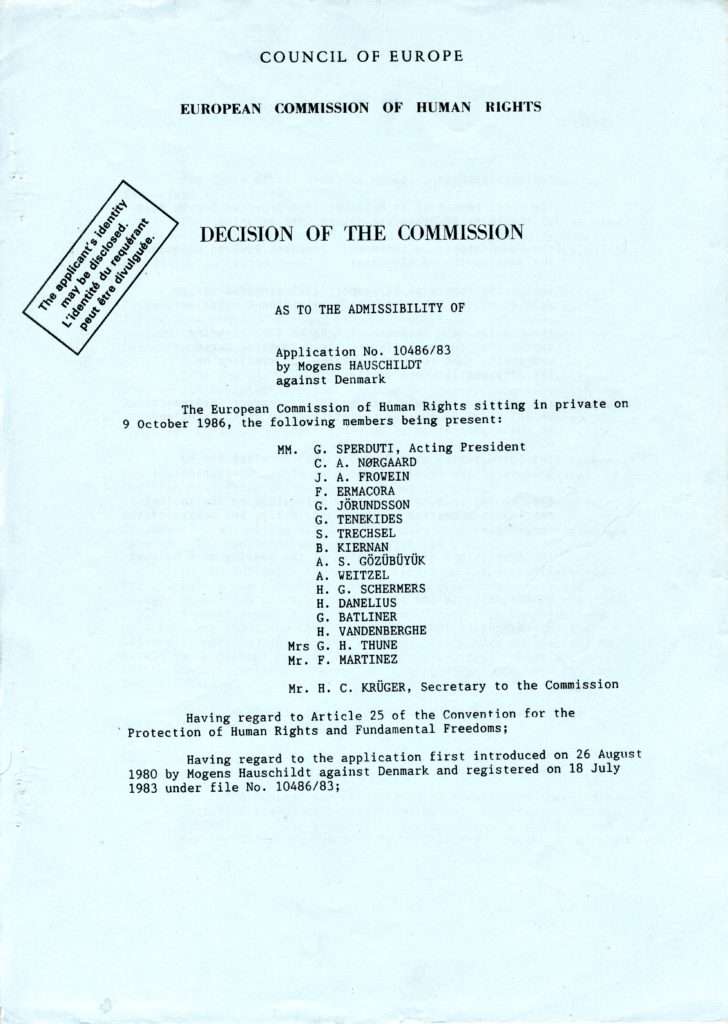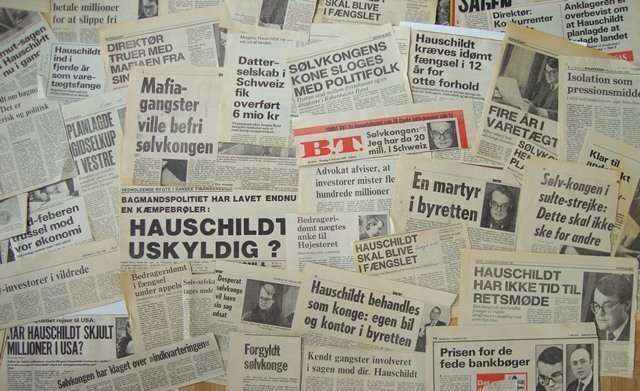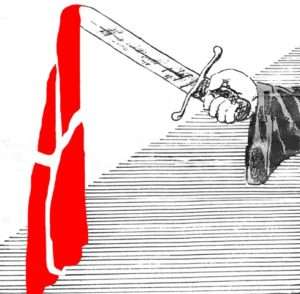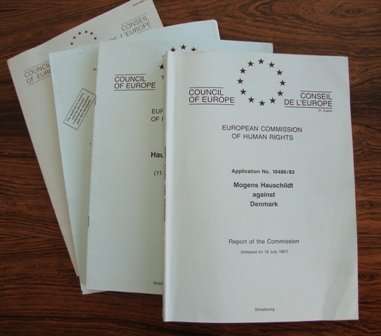MOGENS HAUSCHILDT
vs.
DENMARK
Application no. 10486/83
REPORT BY THE COMMISSION
Adopted on 16 July 1987

The report from the European Commission of Human Rights dated the 1986. (I hope later to insert into the website a better readability as to this report, however in the meantime the report can be downloaded in parts or the whole report:
- The_ECHR_Commission Report_Page_ 1-16
- The_ECHR_Commission_Report_Pages_17-29
- The_ECHR_Commission_Report_Pages_30-40
- The_ECHR_Commission_Report_Pages_41-53
- The_ECHR_Commission_Report_Pages_54-63
- ECHR-Report from the Commission (the whole report)
TABLE OF CONTENTS
Page
- INTRODUCTION
(paras. 1-17) …………………………………………………….. 1
The application
(paras. 2-4) ……………………………………………………….. 1
The proceedings
(paras. 5-12) ……………………………………………………… 1
The present report
(paras. 13-17) ……………………………………………………. 2
- ESTABLISHMENT OF THE FACTS
(paras. 18-42) ……………………………………………………. 4
- The particular facts of the case
(paras. 18-38) ……………………………………………………. 4
- A Relevant domestic law
(paras. 39-42) ……………………………………………………. 9
III. SUBMISSIONS OF THE PARTIES
(paras. 43-89) ……………………………………………………. 12
- The applicant
(paras. 44-70) ……………………………………………………. 12
- The Government
(paras. 71-89) ……………………………………………………. 17
- OPINION OF THE COMMISSION
(paras. 90-115) …………………………………………………… 21
- Point at issue
(para. 90) ………………………………………………………….. 21
- Article 6 of the Convention
(paras. 91-115) …………………………………………………… 21
Dissenting opinion of Mr. Vandenberghe, joined by
- Ermacora, Tenekides, Kiernan,
Gözübüyük, Weitzel and Batliner ………………. 26
APPENDIX I History of the proceedings before
the Commission …………………………………………. 30
APPENDIX II Decision on the admissibility of
the application …………………………………………………… 31
-1-
10486/83
- INTRODUCTION
- The following is an outline of the case as submitted to the European Commission of Human Rights, and of the procedure before the Commission.
- The application
- The applicant, Mogens Hauschildt, is a Danish citizen born in 1941. He resides in Switzerland. Before the Commission, he is represented by Mr. Geoffrey Robertson, a lawyer practising in London.
- The Government of Denmark is represented by their Agent, Mr. Tyge Lehmann, Ministry of Foreign Affairs.
- The case concerns the proceedings relating to criminal charges for economic offences brought against the applicant. The applicant was arrested on 31 January 1980 and detained on remand. His detention I on remand was prolonged at regular intervals and he remained in detention on remand until his release after the judgment of the High Court for Eastern Denmark (Østre Landsret) on 2 March 1984. The applicant complained to the Commission that before convicting him the presiding judge of the Copenhagen City Court (Københavns Byret) and the judges of the High Court had taken numerous decisions as to his continued detention on remand, both before and during the trial before the City Court and the appeal proceedings in the High Court, as well as a number of other decisions regarding the evidence to be collected during the investigation of the case (commissions rogatory). The applicant contends therefore that these courts could not be considered to be impartial within the meaning of Article 6 of the Convention when deciding on his guilt.
- The proceedings .
- As far as the complaint relating to Article 6 of the Convention is concerned, the application was introduced on 27 October 1982 and it was registered on 18 July 1983. The Commission considered the application on 7 December 1983 and on 7 March 1985 and decided on the latter date to give notice of the application to the respondent Government in accordance with Rule 42 para. 2 (b) of its Rules of Procedure and to invite them to present before 24 May 1985 their observations in writing on the admissibility and merits of the application.
- On 11 May 1985 the Commission extended the time-limit for the submission of the Government’s observations until 24 July 1985.
The Government’s observations were submitted on 24 July 1985.
- The applicant was invited to submit his observations in reply before 11 October 1985. Having been granted an extension of the time-limit until 18 November 1985 the applicant submitted his observations on 17 November 1985.
- On 4 March 1986 the Commission decided to invite the parties to appear before it at a hearing on the admissibility and merits of the application.
-2-
10486/83
- The hearing took place on 9 0ctober 1986. The applicant, who was present himself, was represented by Mr. Geoffrey Robertson, barrister, as counsel, by Mr. Folmer Reindel, advocate, as adviser, and by his wife Mary Hauschildt as an assistant. The Government were represented by Mr. Tyge Lehmann of the Ministry for Foreign Affairs as agent, Mr. John Bernhard of the Ministry of Foreign Affairs as- adviser, Mr. Bo Vesterdorf of the Ministry of Justice as counsel, Mr. Michael Elmer of the Ministry of Justice as adviser and Ms. Charlotte Schydt of the Ministry of Justice as adviser.
- Following the hearing, the Commission declared admissible the applicant’s complaint under Article 6 para. 1 of the Convention that his case was not heard by an impartial tribunal. The remainder of the applicant’s complaints was declared inadmissible.
- The parties were then invited to submit any additional observations on the merits of the case which they wished to make.
No further observations on the merits of the case were received from the Government. The applicant submitted additional observations on 9 March 1987, a copy of which was transmitted to the Government.
- After declaring the case admissible the Commission, acting in accordance with Article 28 (b) of the Convention, placed itself at the disposal of the parties with a view to securing a friendly settlement of the case.
Consultations with the parties took place between 13 October 1986 and 28 January 1987. In the light of the parties’ reactions, the Commission now finds that there is no basis, upon which such a settlement can be effected.
- The present Report
- The present report has been drawn up by the Commission in pursuance of Article 31 of the Convention and after deliberations and votes, the following members being present:
- G. SPERDUTI Acting President
- A. NØRGAARD
- A. FROWEIN
- ERMACORA
- JÖRUNDSSON
- TENEKIDES
- TRECHSEL
- KIERNAN
- S. GÖZÜBÜYÜK
- WEITLZEL
- G. SCHERMERS
- DANELIUS
- BATLINER
- VANDENBERGHE
Mrs. G. H. THUNE
- F. MARTINEZ
__________________________________
I was a victim of the state of Denmark: It was the state that took me hostage and traumatised me and my family they never recognised that in any shape or form. In the end, you give up fighting for help. I always considered myself as a “Systemfange”, a prisoner of conscience; the case against me and the companies was entirely political.-
Mogens Hauschildt, Systemfange
This is what my defence lawyers through the years told the Courts and the media:
“The Danish National Bank, the Ministry of Trade, the Company Register and Copenhagen tax authorities all conspired against Hauschildt and the companies whilst using the involvement of the Ministry of Justice, the Special Prosecution, the media and courts as henchmen”
– Advocate Folmer Reindel to the City Court
Advocate Folmer Reindel told the European Court of Human Rights in Strasbourg – 26th September 1988 in front of 17 Judges from 17 member countries:
“It is clear that the Danish authorities had, for a long time, the objective to close down Hauschildt’s successful and profitable business, irrespective that the companies acted correctly and within the Danish law.
From the first day of the action against Hauschildt and his companies, it has been the objective of the Danish authorities to justify their illegal acts at any cost, including keeping Hauschildt in solitary confinement and pre-trial detention for more than four years as a hostage to justice.
The Danish authorities acted within total contempt for the Danish law and justice and the European Human Rights Convention.
Hauschildt and his companies became victims of the Danish State.
“The prosecution could just as easily hold their “court hearings” at their own offices without the judges, the defence and the accused – the result would be the same.”
– Advocate Jørgen Jacobsen said to the Court in 1981
At the outset of the trial in the lower court (Copenhagen City Court) my defence attorney Folmer Reindel said to a leading newspaper, Berlingske Tidende:
“With the collaboration between the judge (Claus Larsen), the prosecution and the prison services, which consequence seriously affect and prevent the defence – I fear a miscarriage of justice”
“All the clients’ losses were created by the closing of the companies and the action by the Special Prosecution, they are responsible for all the clients economic suffering thereafter.” (See Børsen 18th June 1981).
– Advocate John Korsø-Jensen
“I feel that I have been reduced to a defence counsel in a Russian Military Court.” –
– Advocate Folmer Reindel to the Court
“Hauschildt you have been selected – and judged. You were selected because you are a “foreign Dane” with no political affiliation or power, you work in a business which daily deals with Swiss banks, New York and London – movement of money and in a financial market most people in Denmark do not know and can’t participate in, you controlled your business and do not employ many people, not like a factory owner.”
Advocate Jørgen Jacobsen said the above to me during my solitary confinement in July 1980, little did I know that I would be kept in restrictive pre-trial detention for nearly another four years
Bagmandspolitiet directly prevented me from having my complaint about my long solitary confinement and treatment dealt with by the European Commission of Human Rights.Bagmandspolitiet kept a letter for more than two years away from showing me; totally contemptuous of the convention as I was allow free uncensored communication in accordance of the European Convention of Human Right.
There can be no doubt in my and my lawyers s at the time that this was a deliberate act as the Danish authorities did not want my treatment to be subject to a case at the European Court.When I sent my first letter and application to the ECHR in August 1980 and did not hear anything for more than two years and two month, I felt that something had happened, but I did not know that Bagmandspolitiet had kept the letter away from me. The fact that I did not know about the letter in September 1980, prevented me to follow up and ultimate for the Commission dealing with my horrendous treatment and solitary confinement torture by the Danish authorities.



